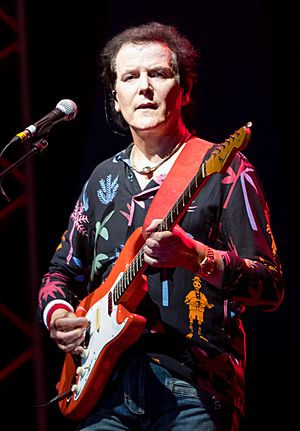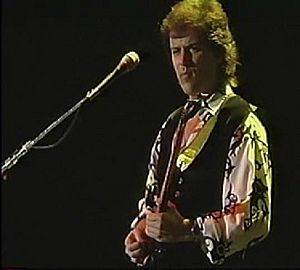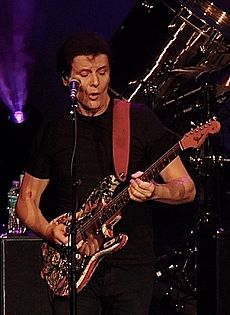Trevor Rabin facts for kids
Quick facts for kids
Trevor Rabin
|
|
|---|---|

Rabin performing with Yes featuring ARW in 2018
|
|
| Background information | |
| Birth name | Trevor Charles Rabin |
| Born | 13 January 1954 Johannesburg, South Africa |
| Genres | |
| Occupation(s) |
|
| Instruments |
|
| Years active | 1972–present |
| Labels | |
Trevor Charles Rabin (born January 13, 1954) is a talented musician, songwriter, and film composer from South Africa. He grew up in Johannesburg in a family that loved music. Trevor started playing the piano and guitar when he was very young.
He became a professional musician who played for many different artists. In 1972, he joined a rock band called Rabbitt, which became quite popular in South Africa. He also released his first solo album, Beginnings. In 1978, Rabin moved to London to grow his music career. He worked as a solo artist and helped produce music for other artists.
In 1981, Rabin moved to Los Angeles. He became very well known as the guitarist for the progressive rock band Yes from 1983 to 1995. His first album with Yes, 90125 (released in 1983), is their best-selling album. It included the famous song "Owner of a Lonely Heart", which became a number one hit in the US. After working on other albums like Big Generator (1987) and Union (1991), Rabin produced Talk (1994) and then left the band. During his time with Yes, Trevor Rabin also became an American citizen.
After leaving Yes, Rabin became a very successful film composer. He has written music for over forty movies. He often worked with producer Jerry Bruckheimer. Rabin has won many awards for his film music. He took a short break from movies to record his fifth solo album, Jacaranda (2012). In 2016, he toured and recorded with a new version of Yes, called Yes Featuring Jon Anderson, Trevor Rabin, Rick Wakeman. In 2017, Trevor Rabin was honored by being inducted into the Rock and Roll Hall of Fame as a member of Yes. He also created the theme songs for popular sports shows like NBA on TNT and MLB on TBS.
Contents
Early Life and Musical Beginnings
Trevor Rabin was born on January 13, 1954, in Johannesburg, South Africa. His family was very musical. His mother, Joy, was a painter, dancer, actress, and classical pianist. His father, Godfrey, was a lawyer, musician, conductor, and the main violinist in the Johannesburg Philharmonic Orchestra. They met while serving in the South African army's entertainment group. Trevor's family was strongly against the unfair system of apartheid in South Africa.
Rabin went to Parktown Boys' High School in Johannesburg. He started playing the piano at age six. He practiced for an hour every day for twelve years. When he was twelve, he began teaching himself to play the guitar. He never had a formal guitar lesson. A year later, he played in a band called The Other. He then formed Conglomeration and later joined Freedom's Children. He wrote their song "State of Fear." For a few months, Rabin studied how to arrange music, orchestrate, and conduct. He wanted to be a conductor, but he decided to focus on rock music instead.
When he was sixteen, a record producer discovered Rabin. He became a session musician, which means he played music for recordings in many different styles. These styles included jazz, country, and classical music. He was influenced by artists like Hank Marvin, The Beatles, and Jimi Hendrix. At nineteen, Rabin served a year in the South African Army's entertainment division. He arranged music for their big band and played in a rock group. In 1972, Rabin bought his first Fender Stratocaster guitar.
Music Career Highlights
Early Bands and Solo Work (1972–1978)
In 1972, Rabin formed the rock band Rabbitt with his old bandmates. Their first song was a cover of "Locomotive Breath" by Jethro Tull. Their first album, Boys Will Be Boys, came out in 1975. Rabin won an award for his orchestral arrangements on the album. The band also won an award for Best Contemporary Music Artist in 1976.
Rabbitt's second album, A Croak and a Grunt in the Night, was released in 1977. Rabin won another award for producing this album. He also produced and arranged Margaret Singana's album Where is the Love. In 1977, Rabin released his first solo album, Beginnings. He played almost all the instruments on the album himself.
Rabbitt signed a deal with a US record label, Capricorn Records. However, they could not tour outside South Africa because of the country's unfair policies. This made Rabin decide to leave South Africa. He had also scored his first movie by this time, a 1976 film called Death of a Snowman.
Moving to London and Los Angeles (1978–1982)
In January 1978, Rabin moved to London to continue his solo career. He signed a record deal with Chrysalis Records. In September 1978, they re-released his first solo album under the name Trevor Rabin. Billboard magazine gave it a good review. Later in 1978, Rabin produced and arranged Noel McCalla's album Night Time Emotion.
In 1979, Rabin released his second solo album, Face to Face. He toured the UK to promote it, opening for guitarist Steve Hillage. He also helped produce the debut album by Wild Horses. In 1980, Rabin played guitar and helped produce Chance by Manfred Mann's Earth Band.
Rabin's third solo album, Wolf, was released in 1980. He sang, played guitars, and keyboards on it. After this album, Rabin left Chrysalis because he felt they didn't promote his music enough. He also played guitar on songs for Manfred Mann's Earth Band's album Somewhere in Afrika.
In 1981, Rabin moved to Los Angeles. He started working on songs for a fourth solo album. He also met musicians who would form the supergroup Asia, but his songs didn't fit their style. He almost formed a new group with John Wetton, Carl Palmer, and Rick Wakeman, but it didn't happen. Rabin then sent his new songs to different record labels. He eventually decided to work with Chris Squire and Alan White, who were former members of the band Yes.
Joining Yes and Solo Success (1982–1995)
In late 1982, Rabin, Squire, and White formed a band called Cinema. They included original Yes keyboardist Tony Kaye. They recorded the album 90125. Most of the songs were based on Rabin's ideas. The album had a more commercial sound than Yes's earlier music. During the recording, former Yes singer Jon Anderson joined the group. This led to the band becoming a reformed version of Yes. Rabin was unsure about this at first, as he felt the new music was different.
90125 was released in 1983. It became the band's best-selling album, selling three million copies in the US. The main song, "Owner of a Lonely Heart", written by Rabin, reached number one on the Billboard charts. Yes toured the world in 1984 and 1985. Rabin is featured in the concert film 9012Live and the live album 9012Live: The Solos.
Their next album, Big Generator, was released in September 1987. It included the songs "Love Will Find a Way" and "Rhythm of Love." The album sold well and was certified Platinum. During the album's creation, Bob Dylan asked Rabin to play guitar on two of his songs.
In 1988, Jon Anderson left Yes for a while. Rabin used this time to make his fourth solo album, Can't Look Away. It was released in July 1989 and reached No. 111 on the Billboard 200 chart. The song "Something to Hold on To" was nominated for a Grammy Award. Rabin toured the US in 1989 and 1990. Recordings from this tour were released as the live album Live in LA in 2003.
From 1990 to 1992, Rabin was part of an eight-member version of Yes. This led to the album Union. Rabin felt this was a good way to get the band back on tour. He wrote songs like "Lift Me Up" and "Miracle of Life."
Rabin's last album with Yes was Talk, released in 1994. Rabin and Anderson wrote the album together. Rabin also produced it. Songs like "The Calling" and "Walls" became popular. After touring in 1995, Rabin left the band to focus on writing music for films.
Becoming a Film Composer (1995–2012)
In 1995, Rabin started writing music for films. He scored the movie The Glimmer Man (1996). He got the job after the star, Steven Seagal, asked him for guitar lessons. Rabin told Seagal he wanted to get into film scoring, and Seagal offered him the job. Rabin then began a long partnership with producer Jerry Bruckheimer. He has scored 13 films for Bruckheimer.
In 1997, Rabin performed his song "I Can't Look Away" at a concert for Nelson Mandela in Johannesburg. He said meeting Mandela was a very proud moment. In the early 2000s, Rabin turned down an offer to join the band Foreigner because he was busy with film scoring. In 2003, Rabin released some of his demo songs, including ones that Yes recorded, on an album called 90124. Later that year, he released Live in LA, a live album from his 1989 tour. In 2004, Rabin performed with former and current members of Yes at a tribute concert for producer Trevor Horn.
Rabin's music for the film Glory Road featured vocals from Alicia Keys. His song "Titans Spirit" from Remember the Titans (2000) has been used for NBC's coverage of the Olympic Games and for Barack Obama's speech when he won the 2008 US presidential election. Rabin also composed theme music for sports shows like NBA on TNT (2002), MLB on TBS (2007), and March Madness (2011). In 1995, he created sounds for Apple computers.
Recent Music and Band Work (2012–Present)
Rabin's fifth solo album, Jacaranda, was released on May 8, 2012. It was his first solo album in 23 years. He started writing the music in 2007, wanting to create challenging instrumental music. He played most of the instruments himself, with help from drummers Vinnie Colaiuta, Lou Molino III, and his son Ryan.
In 2016, Rabin took a break from film scoring to form a new version of Yes with Jon Anderson and Rick Wakeman. They toured worldwide from October 2016 to 2018. They planned a studio album, but it was difficult to work on because they lived in different places.
In 2020, a 10-CD box set of Rabin's solo music, Yes recordings, and soundtracks was released. It was called Changes. Rabin also performed at a tribute concert for drummer Alan White on October 2, 2022.
In December 2022, Rabin announced that his sixth studio album, Rio, was finished. It took several years to make. This album is Rabin's first to feature his lead vocals since Can't Look Away. Songs like "Big Mistakes," "Push," and "Oklahoma" were released as digital singles. The album was released on October 6, 2023.
Personal Life
Trevor Rabin has been married to his wife Shelley May since 1978. They met when they were in school. They have lived in Hollywood, Los Angeles, since 1984. They have one son, Ryan, who is a drummer and record producer. Ryan was a member of the band Grouplove from 2009 to 2017.
In 1987, Rabin said he carried South Africa with him, even though he no longer lived there. He refused to perform in Sun City because it would have supported the unfair apartheid system. In 1991, Rabin became a US citizen. He is also a godfather to Alan White's son, Jesse.
Awards and Recognition
Rabin has received eleven Broadcast Music Incorporated film score awards. He also received a Lifetime Achievement Award from the Temecula Valley International Film Festival.
In June 2011, Rabin won an award at the 26th ASCAP Film and Television Music Awards for his work on The Sorcerer's Apprentice (2010). On June 28, 2012, Rabin received a Henry Mancini Award at the 27th ASCAP Film & Television Music Awards. He also performed "Owner of a Lonely Heart" with his son's band Grouplove.
In 2017, Trevor Rabin was inducted into the Rock and Roll Hall of Fame as a member of Yes. He performed "Owner of a Lonely Heart" and "Roundabout" at the ceremony.
Musical Influences
Rabin considers Bernard Herrmann his favorite film composer. He has also named Arnold Schoenberg as one of his favorite classical composers. Other classical composers like Beethoven, Ravel, Elgar, and Tchaikovsky have also influenced his music.
Discography
As Solo Artist
- Beginnings (1977) (reissued in 1978 as Trevor Rabin)
- Face to Face (1979)
- Wolf (1981)
- Can't Look Away (1989)
- Live in LA (2003, live)
- 90124 (2003, archival compilation)
- Jacaranda (2012)
- Rio (2023)
As Band Member
Rabbitt
- Boys Will Be Boys! (1975)
- A Croak and a Grunt in the Night (1977)
- Morning Light (1977, maxi single)
- 1972–1978: Limited Souvenir Edition (1978, EP)
Yes
- 90125 (1983)
- Big Generator (1987)
- Union (1991)
- Talk (1994)
- 9012Live: The Solos (1985, live)
- Union Live (2011, live)
Yes Featuring Jon Anderson, Trevor Rabin, Rick Wakeman
- Live at the Apollo (2018, live)
Film Scores
- Death of a Snowman (1976)
- Fair Game (1995, additional music only)
- The Glimmer Man (1996)
- Con Air (1997)
- Homegrown (1998)
- Armageddon (1998)
- Enemy of the State (1998)
- Jack Frost (1998)
- Deep Blue Sea (1999)
- Whispers: An Elephant's Tale (2000)
- Gone in 60 Seconds (2000)
- Remember the Titans (2000)
- The 6th Day (2000)
- American Outlaws (2001)
- Rock Star (2001)
- The One (2001)
- Texas Rangers (2001)
- Bad Company (2002)
- The Banger Sisters (2003)
- Kangaroo Jack (2003)
- Bad Boys II (2003)
- Torque (2004)
- Exorcist: The Beginning (2004)
- National Treasure (2004)
- Coach Carter (2005)
- Dominion: Prequel to the Exorcist (2005)
- The Great Raid (2005)
- Glory Road (2006)
- Snakes on a Plane (2006)
- Gridiron Gang (2006)
- Flyboys (2006)
- The Guardian (2006)
- Hot Rod (2007)
- National Treasure: Book of Secrets (2007)
- Get Smart (2008)
- 12 Rounds (2009)
- Race to Witch Mountain (2009)
- G-Force (2009)
- The Sorcerer's Apprentice (2010)
- I Am Number Four (2011)
- 5 Days of War (2011)
- The Movement: One Man Joins an Uprising (2011)
- Grudge Match (2013)
- Max (2015)
- The Misfits (2021)
Television Scores
- Zero Hour (2013)
- 12 Monkeys (2015–2016)
- Agent X (2015)
- Cine Chalom (2020)
- Digman! (2023)
- National Treasure: Edge of History (2022–2023)
Guest Appearances and Collaborations
- Margaret Singana – Where Is the Love (1976) – Producer, arranger
- Manfred Mann's Earth Band – Chance (1980) – Producer
- Wild Horses – Wild Horses (1980) – Co-Producer
- Manfred Mann's Earth Band – Somewhere in Afrika (1982) – Lead guitar on "Redemption Song", guitar solo on "Runner"
- Frankie Goes To Hollywood – Welcome to the Pleasuredome (1984) – backing vocals and bass guitar
- Jon Anderson – 3 Ships (1985) – Guitar
- Frankie Goes To Hollywood – Liverpool (1986) – Guitar
- Lisa Hartman – 'Til My Heart Stops (1987) – Guitar
- Marc Jordan – Talking Through Pictures (1987) – Guitar
- Bonham – The Disregard of Timekeeping (1989) – bass on "Bringing Me Down", "Holding on Forever" and "Don't Walk Away", backing vocals
- Seal – Seal (1991) – Guitar
- Paul Rodgers – Muddy Water Blues: A Tribute to Muddy Waters (1993) – Guitar
- Michael Jackson – HIStory: Past, Present and Future, Book I (1995) – Guitar
- Various Artists – Crossfire: A Salute To Stevie Ray Vaughan (1996) – Guitar
- Tina Turner – Wildest Dreams (1996) – Guitar, Background Vocals
- Mark Mancina – Twister (1996) – Guitar on "The Hunt: Going Green"
- Various Artists – Merry Axemas Vol. 2 (1998) – Guitar, Keyboards
- Rick Wakeman – Return to the Centre of the Earth (1999) – Vocals, Guitar on "Never Is A Long, Long Time"
- Roger Hodgson – Open The Door (2000) – Guitar, Keyboards & Backing Vocals on "The More I Look"
- Don Harper's Oceana Orchestra – Dream and Variations (2009) – Guitar on "Where Do We Go From Here"
- Mr. Mister – Pull (2010) – Guitar, Bass
- Jason Becker – Triumphant Hearts (2018) – "River of Longing"
- Carly Rae Jepsen - The Loneliest Time (2022) – Guitar on "Talking to Yourself"
- Joe Bonamassa - Live at the Hollywood Bowl with Orchestra (2024) - Arranger on "Prisoner" and "The Ballad Of John Henry"
See also
 In Spanish: Trevor Rabin para niños
In Spanish: Trevor Rabin para niños
 | Delilah Pierce |
 | Gordon Parks |
 | Augusta Savage |
 | Charles Ethan Porter |



